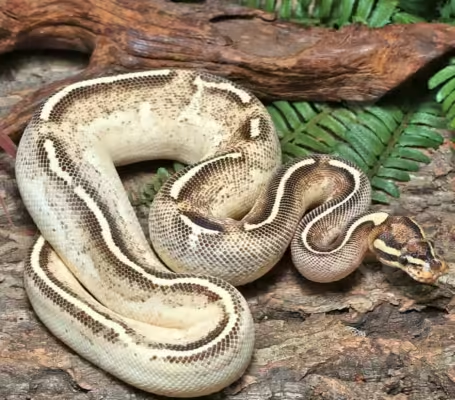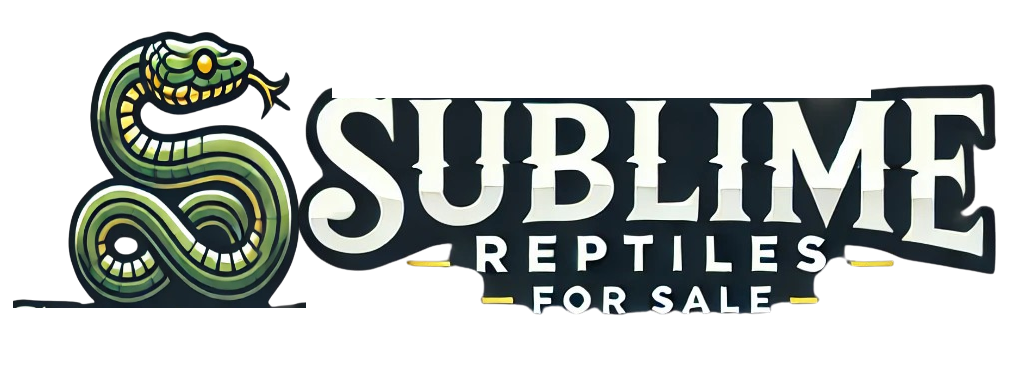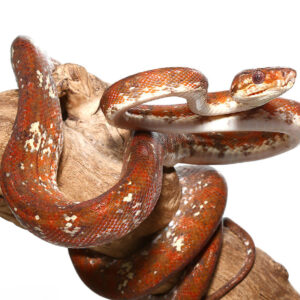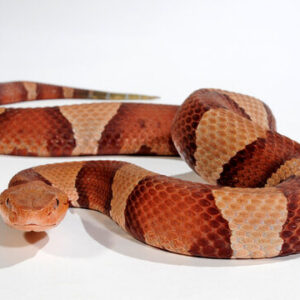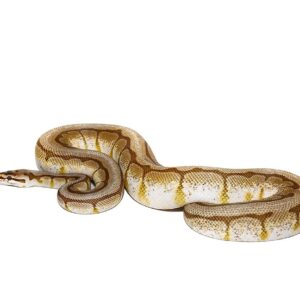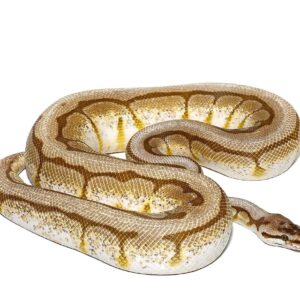
OD Enchi Freeway Ball Python For Sale
$449.99
WE HAVE A OD ENCHI FREEWAY BALL PYTHON FOR SALE. HERE ARE SOME HIGHLIGHTS:
- Python regius
- Captive Bred
- Approximately 32 Inches In Length
- Roughly 430 Grams And Growing
- Adults Can Grow Up To 4 – 5 Feet
- Feeding On Live Rat Pups Weekly
FUN FACTS!
- A Great Beginner Pet!
- Ball Pythons Are Native To Central And Western Africa And Thrive In These Warm, Tropical Areas
- When Hatching Out Of The Egg They Can Be As Small As 10 Inches
- With Proper Care And Setup These Snakes Can Live 20 – 25+ Years In Captivity
Description
The OD Enchi Freeway Ball Python is a captivating morph that has garnered significant attention among reptile enthusiasts for its unique genetic makeup and stunning appearance. This particular morph is the result of a complex genetic combination involving three distinct traits: Orange Dream (OD), Enchi, and Freeway (a combination of Asphalt and Yellowbelly genes). The interplay of these genes produces a ball python with a remarkable and vibrant pattern, setting it apart from other morphs in the reptile trade.
The origins of the OD Enchi Freeway Ball Python lie in the innovative breeding efforts of herpetoculturists who aimed to create visually striking and genetically diverse snakes. The Orange Dream gene is known for enhancing color intensity and brightness, while the Enchi gene brings out distinctive pattern alterations and reduces black pigmentation, resulting in a cleaner and more vivid appearance. The Freeway combination, derived from Asphalt and Yellowbelly, adds another layer of complexity, contributing to the intricate and eye-catching patterns that characterize this morph.
One of the most appealing aspects of the OD Enchi Freeway Ball Python is its extraordinary appearance. The morph typically showcases a vibrant mix of orange, yellow, and black hues, with intricate patterns that can resemble a mosaic or a freeway, hence the name. This visually stunning snake has quickly become a favorite among collectors and breeders, driving its popularity and demand in the market.
The growing popularity of the OD Enchi Freeway Ball Python can be attributed to both its aesthetic appeal and the fascinating genetic story behind its creation. As more reptile enthusiasts seek out unique and beautiful morphs, the OD Enchi Freeway stands out as a prime example of the innovative possibilities within the world of ball python breeding. Its distinctive look and genetic heritage make it a highly desirable addition to any collection, ensuring its continued prominence in the reptile trade.
Genetics and Morphology
The OD Enchi Freeway Ball Python is a striking example of how selective breeding can produce remarkable variations within a species. This morph is a product of combining three distinct genetic traits: the Orange Dream (OD), Enchi, and Freeway genes. Each gene contributes unique characteristics, resulting in a visually captivating snake with a complex and vibrant pattern.
The Orange Dream gene is known for enhancing the brightness and intensity of the python’s coloration, often turning standard hues into rich, vivid oranges and yellows. When paired with the Enchi gene, the colors become even more pronounced, with cleaner and more defined patterns. The Enchi gene also tends to reduce the black pigmentation, creating a smoother and more uniform look.
The Freeway gene, a combination of the Asphalt and Yellowbelly genes, adds a layer of complexity to the pattern. It generates a distinctive, interwoven design that sets the Freeway morph apart from other ball pythons. When all three genes—Orange Dream, Enchi, and Freeway—are combined, the result is a snake with a dazzling array of oranges, yellows, and intricate patterns that are both unique and breathtaking.
Physically, the OD Enchi Freeway Ball Python exhibits a series of interconnected, jagged markings that run down its body. These markings are usually bordered by lighter shades, creating a high-contrast effect that enhances the overall appearance of the snake. The head often displays a distinct, clean pattern that complements the body’s intricate design.
Breeding the OD Enchi Freeway Ball Python requires a strategic approach to maximize the likelihood of producing this specific morph. When breeding, each gene—Orange Dream, Enchi, and Freeway—must be present in at least one parent. The genetic probabilities can be complex, but understanding the inheritance patterns of each trait is crucial for successful breeding. By carefully selecting breeding pairs that carry these genes, breeders can increase the chances of producing offspring that exhibit the stunning characteristics of the OD Enchi Freeway morph.
Habitat and Natural Behavior
Ball pythons, including the captivating OD Enchi Freeway morph, are native to the grasslands and savannas of West and Central Africa. These regions provide a warm, humid climate that is essential for their well-being. In their natural habitat, ball pythons are known to seek out burrows or hide under dense foliage to avoid the heat of the day, showcasing their preference for secluded and secure environments.
Primarily nocturnal, ball pythons exhibit most of their activity during the night. This includes hunting for prey, such as small mammals and birds, which they detect using their keen sense of smell and heat-sensing pits. Their feeding habits are characterized by ambush predation, where they lie in wait for unsuspecting prey to come close before striking with precision. This behavior underscores their patience and stealth, integral aspects of their survival strategy.
In terms of unique behaviors, ball pythons are known for their defensive posture, coiling into a tight ball with their head protected in the center when threatened. This has earned them the name “ball python.” Additionally, they exhibit a gentle temperament, rarely showing aggression unless provoked or stressed.
When these natural behaviors are translated to a captive environment, ball python owners can expect their pets to be relatively docile and easy to handle. Providing an enclosure that mimics their natural habitat is crucial—this includes appropriate temperature gradients, humidity levels, and plenty of hiding spots. Owners should also be aware of their nocturnal nature, meaning that these snakes will be more active during the evening and night hours.
Overall, understanding the habitat and natural behaviors of the OD Enchi Freeway Ball Python allows for better care and a more enriching environment, ensuring that these fascinating creatures thrive in captivity just as they do in the wild.
Housing and Enclosure Requirements
Creating a suitable habitat for an OD Enchi Freeway Ball Python is crucial for its health and well-being. The enclosure should be spacious enough to allow for natural movement and behavior. For an adult OD Enchi Freeway Ball Python, a tank size of at least 40 gallons is recommended. Larger tanks can be beneficial, especially for providing ample space for climbing and exploring.
Substrate options for the enclosure can vary, but it is essential to choose one that maintains appropriate humidity levels. Aspen, cypress mulch, and coconut husk are popular choices due to their ability to retain moisture without becoming overly damp. It is important to avoid substrates that can cause impaction or respiratory issues, such as sand or cedar shavings.
Temperature regulation within the enclosure is vital. The ambient temperature should be maintained between 75-80°F, with a basking spot that reaches 88-92°F. A heat mat or ceramic heat emitter can be used to achieve these temperatures. Additionally, the enclosure should have a temperature gradient, allowing the snake to move between warmer and cooler areas as needed.
Humidity levels should be kept between 50-60%, with occasional spikes up to 70% during shedding periods. A hygrometer can help monitor these levels accurately. Mist the enclosure regularly or provide a humidity box to maintain the required moisture levels. Excessive humidity can lead to respiratory infections, so it is crucial to strike a balance.
Providing hiding spots is essential for the OD Enchi Freeway Ball Python’s sense of security. At least two hides should be placed in the enclosure—one on the warm side and another on the cool side. These hides can be made from commercially available reptile hides or creatively crafted from natural materials. Climbing opportunities, such as branches or logs, should also be incorporated to stimulate the snake’s natural behaviors.
Lastly, ensuring the enclosure is secure and escape-proof is paramount. Ball pythons are known for their ability to find even the smallest gaps. A tightly fitting lid or a locking mechanism is necessary to prevent any potential escapes. Regularly inspect the enclosure for any signs of wear or gaps and address them promptly to ensure the safety of your OD Enchi Freeway Ball Python.
Feeding and Nutrition
The dietary needs of the OD Enchi Freeway Ball Python are crucial for maintaining its health and vitality. As with other ball pythons, the primary diet consists of appropriately sized rodents. Young or juvenile OD Enchi Freeway Ball Pythons typically consume pinky mice or small hopper mice, while adults can move on to larger prey such as adult mice or small rats. It is essential to feed prey items that are no larger than the widest part of the snake’s body to avoid digestion issues.
Feeding frequency is another important aspect of proper nutrition. Juvenile OD Enchi Freeway Ball Pythons should be fed every 5 to 7 days to support their rapid growth, whereas adults can be fed every 7 to 14 days, depending on their size and activity level. Consistency in feeding schedules helps in maintaining their metabolic health and prevents obesity, a common issue in captivity.
Ensuring a balanced diet goes beyond just providing prey. It is advisable to occasionally offer a varied diet that includes different types of rodents to ensure a range of nutrients. However, one should avoid feeding live prey due to the potential risk of injury to the snake. Pre-killed or frozen-thawed prey is safer and equally nutritious.
If your OD Enchi Freeway Ball Python refuses to eat, it is important to first rule out environmental stressors such as improper temperature or humidity levels. Sometimes, snakes may refuse food during shedding cycles or breeding seasons. Monitoring the snake’s weight regularly can help identify any potential health issues early. A consistent weight loss could indicate underlying health problems and necessitates a visit to a veterinarian.
Unique to the OD Enchi Freeway morph is the potential for higher metabolic rates, which may require slightly more frequent feedings compared to other ball python morphs. Always ensure fresh water is available, as hydration is integral to their overall health.
Health and Common Issues
The OD Enchi Freeway Ball Python, like all reptiles, can be susceptible to a variety of health issues if not properly cared for. Recognizing signs of illness early and implementing preventive care measures are crucial for maintaining the health of these beautiful creatures. Common health issues that may affect OD Enchi Freeway Ball Pythons include respiratory infections, parasitic infestations, and skin conditions.
Respiratory infections are often caused by inadequate enclosure conditions, particularly improper temperature and humidity levels. Signs of respiratory issues include wheezing, excessive mucus, and open-mouth breathing. Ensuring that the enclosure maintains the appropriate temperature gradient and humidity levels can help prevent such infections.
Parasitic infestations, both internal and external, are another concern. Mites and ticks are common external parasites that can cause significant discomfort and health problems. Regularly inspecting your python for these pests and maintaining a clean enclosure can help mitigate this risk. Internal parasites, such as worms, may require fecal examinations by a qualified reptile veterinarian for accurate diagnosis and treatment.
Skin conditions, including retained shed and fungal infections, can also affect OD Enchi Freeway Ball Pythons. Proper humidity levels and a suitable substrate are essential to facilitate healthy shedding cycles. Additionally, providing adequate hiding spots can reduce stress, which is a significant factor in preventing skin issues.
Preventive care is indispensable for the well-being of OD Enchi Freeway Ball Pythons. Regular health checks, either performed by the owner or a veterinarian, can help detect problems early. Maintaining proper enclosure conditions—such as optimal temperature, humidity, and cleanliness—is paramount. Reducing stress by providing an environment with minimal disturbances and ample hiding places is also beneficial.
Finding a qualified reptile veterinarian is essential for the health of your OD Enchi Freeway Ball Python. Regular veterinary visits, even when the snake appears healthy, can help identify and address potential health issues before they become serious. Timely medical intervention, guided by a knowledgeable veterinarian, can significantly improve the prognosis for any health conditions that may arise.
Breeding and Reproduction
Breeding OD Enchi Freeway Ball Pythons requires a thorough understanding of their mating behaviors, gestation periods, and egg-laying practices. To initiate the breeding process, it is essential to create an optimal environment that mimics their natural habitat. The first step involves ensuring both the male and female are in peak health and have reached sexual maturity, typically around 3-4 years of age for females and 1-2 years for males.
Setting up the breeding environment involves regulating the temperature and lighting to simulate the seasonal changes that trigger reproductive behaviors. Gradually lowering the temperature by a few degrees over a period of weeks can help stimulate mating. Introducing the male to the female’s enclosure should be done cautiously, observing their interactions to ensure compatibility. Successful mating is often indicated by the male’s courtship behavior, such as tail wrapping and prolonged cloacal contact.
Once mating has occurred, the female enters a gestation period that lasts approximately 30-50 days. During this time, maintaining optimal environmental conditions is crucial for the development of the eggs. The female will seek a secluded, warm area to lay her clutch, which can range from 4 to 10 eggs. Ensuring a proper laying site with adequate humidity and warmth can facilitate a smooth egg-laying process.
The incubation process for OD Enchi Freeway Ball Python eggs typically lasts around 55-60 days, with an ideal incubation temperature of 88-90°F. It is vital to maintain a stable temperature and humidity level within the incubation box to ensure the healthy development of the embryos. Regular monitoring and adjustments may be necessary to prevent any fluctuations that could jeopardize the eggs.
Upon hatching, the young snakes require specialized care to thrive. Hatchlings should be housed individually in small enclosures with appropriate humidity and temperature settings. Feeding should commence after their first shed, usually within 7-10 days post-hatching, starting with appropriately sized prey items such as pinky mice. Providing a consistent feeding schedule and monitoring their growth and health are essential for raising robust and healthy OD Enchi Freeway Ball Pythons.
Conclusion and Additional Resources
The OD Enchi Freeway Ball Python is a remarkable reptile, captivating both novice and experienced enthusiasts with its stunning appearance and intriguing genetic makeup. Throughout this blog post, we have explored various aspects of this unique species, including its distinct coloration, genetic inheritance, and care requirements. These ball pythons not only showcase the beauty of selective breeding but also highlight the complexity of reptile genetics.
Responsible ownership is paramount when it comes to maintaining the well-being of OD Enchi Freeway Ball Pythons. Potential owners should be well-informed about the specific needs of these reptiles, including appropriate housing, diet, and healthcare. It is crucial to create an environment that mimics their natural habitat as closely as possible to ensure their health and longevity.
For those interested in learning more about OD Enchi Freeway Ball Pythons, there are numerous reputable resources available. Websites such as the World of Ball Pythons and the Ball Python Morphs Guide offer extensive information on various morphs, breeding practices, and care guidelines. Additionally, books like “The Complete Ball Python” by Kevin McCurley provide in-depth insights into the husbandry and breeding of ball pythons.
Joining online communities can also be highly beneficial for both new and seasoned owners. Platforms like the Ball Python Forum and various social media groups allow enthusiasts to share experiences, ask questions, and seek advice from fellow reptile keepers. These communities can be invaluable in providing support and fostering a deeper understanding of the responsibilities involved in caring for OD Enchi Freeway Ball Pythons.
Ultimately, prospective owners should conduct thorough research and carefully consider the long-term commitment required to care for these captivating reptiles. By doing so, they can ensure a rewarding and fulfilling experience, both for themselves and their OD Enchi Freeway Ball Pythons.
